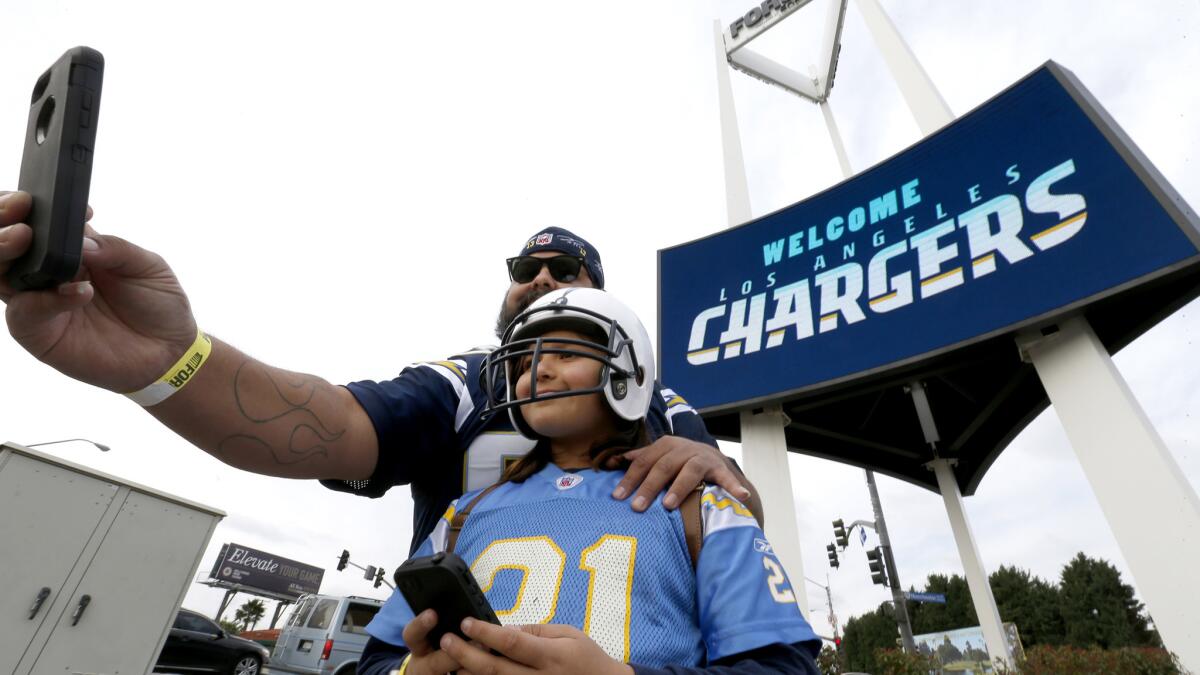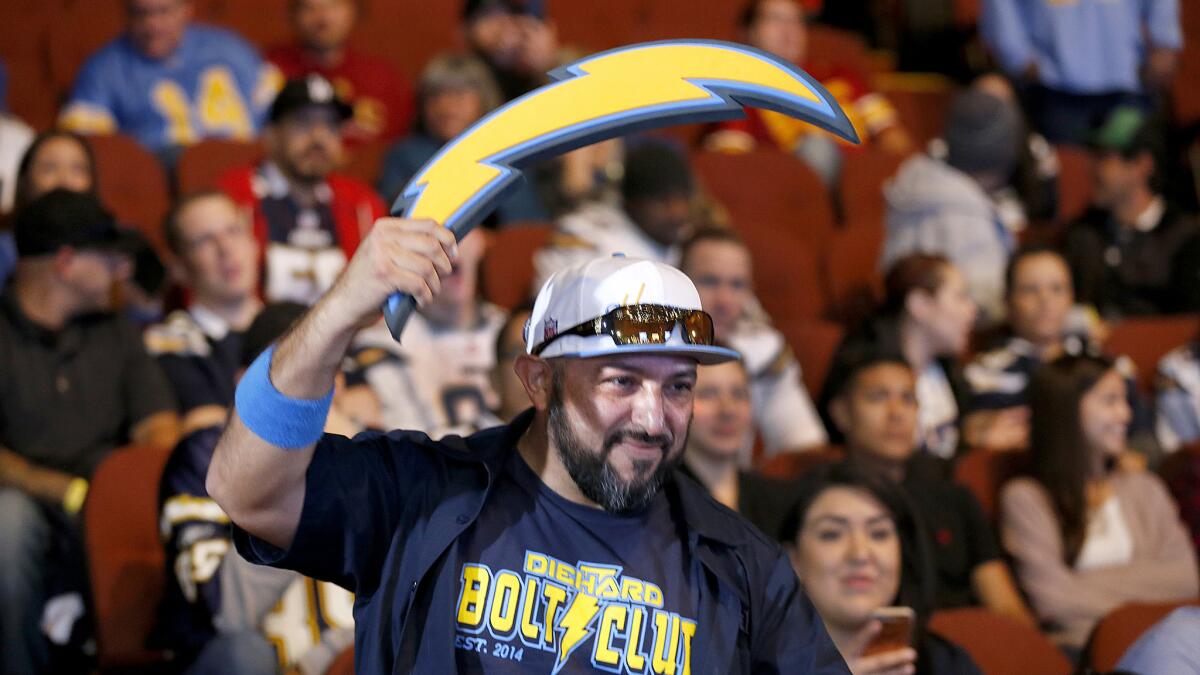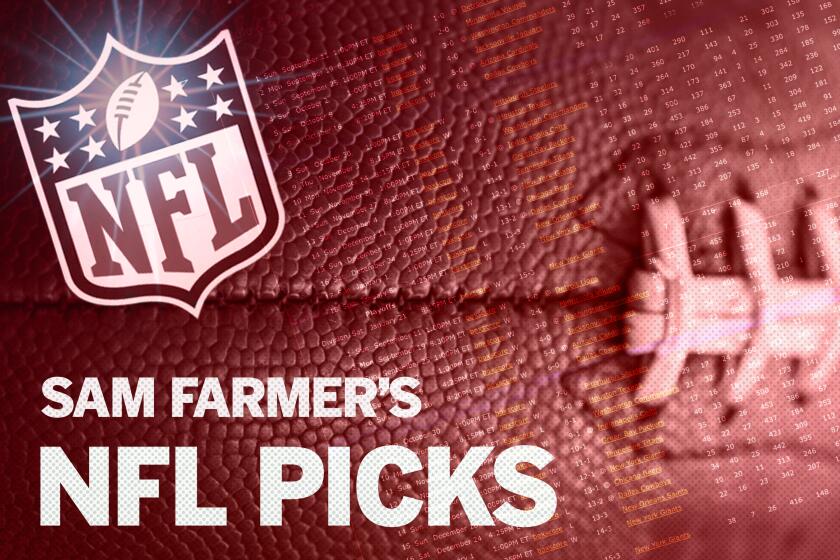Chargers take their ‘Fight for L.A.’ to the people

- Share via
Scrolling down past a grainy video of your niece’s dance recital, your old roommate’s engagement photos and your uncle’s political manifesto, you might’ve noticed an advertised declaration of battle from this city’s newest pro sports team.
The Chargers are trying to let the people of Los Angeles know they’re up for a challenge, and even your Facebook page isn’t safe.
They’re here to “Fight for L.A.” — a motto they’ve chosen to be the guiding principle in their move into the market.
But that fight? It’s not directed at the Rams, per se. Nor is it directed at the Lakers, the Dodgers, the Kings, Hollywood, the Pacific Ocean, the trendy restaurants, the hipster bars or the hottest nightclubs.
No, it’s a fight to prove to the people of Los Angeles that the Chargers really belong here — that they deserve a slice of attention in a town that’s already stretching people’s eyes in so many directions.
“I don’t expect anything to be handed to us,” Chargers President and CEO Dean Spanos told The Times in an interview Thursday last week. “We didn’t expect a red carpet welcome. We’re one of a bunch of teams here, and we’ve got to prove ourselves. And we’re going to fight for every fan and every game and go from there.”
To be clear, if the carpet that welcomed the Chargers into town was red, it was that color only from the maiming they took as they moved to Los Angeles. A logo announcing the team’s arrival was trashed on social media. And when that logo appeared on the Staples Center scoreboard during a Lakers-Clippers game, the two rival fan bases agreed to boo.
“You just have to own everything in L.A. If something happens, and it doesn’t go right, you can’t ignore it. You can’t run away from it. You have to own it,” said Mark Fabiani, special counsel for the Chargers. “And, we had a bump in the road on the very first day with the logo.”
It was quickly retired, with A.G. Spanos, the team’s president of business operations, issuing a statement to Pro Football Talk that also included the phrase “own it.”
“It’s not necessarily the way you’d operate in another market, maybe, but certainly in L.A., it’s going to be one of our operating principles,” Fabiani said. “If we make mistakes, we’re going to own up to them and plow through them.”
The logo, the scoreboard booing, articles about whether or not the team was doing the right things, articles about whether or not the star quarterback wanted to make the trip up the freeway, none of these things qualify as bad in Los Angeles, Fabiani said.
“You embrace it,” he said. “If people are booing you, at least they’re interested enough to boo you. … If we’re not getting reactions from people, if people aren’t debating us, then we have a problem. … All of that’s good for us.”

For the Chargers, a big part of the “fight” is simply staying in the conversation.
“It’ll be fiercely competitive. We knew that coming in,” Dean Spanos said. “With success here there’s great upside. We have a lot of consultants, [Fabiani] being one, but I think one of the big things for us is we have to keep being engaged with the media as best we can. We want our players up here. We’re going to have a presence up here as best we can until we actually get moved in.
“If I could move tomorrow, I would move tomorrow.”
That move won’t happen until well into the summer, but in the meantime, the Chargers are committed to taking one of Los Angeles’ biggest challenges — visibility — head-on.
Ownership and executives have met with most of the city’s power brokers, ranging from Mayor Eric Garcetti to Lakers President Jeanie Buss to AEG Chief Executive Philip Anschutz to Casey Wasserman.
Spanos, his wife and some Chargers players were expected to attend the Grammy Awards on Sunday night. On Monday, executives will have a luncheon to meet with Orange County’s business and local leaders.
Quarterback Philip Rivers and defensive end Joey Bosa, the NFL’s defensive rookie of the year, have appeared on “Jimmy Kimmel Live.” Pro Bowl cornerback Casey Hayward appeared on two local news programs Friday and served as a special correspondent at the NAACP Image Awards.
“It’s hard when your assets aren’t here,” Dean Spanos said. “It’s hard, but we’re going to do the best we can.”
Playing to a limited live audience in Carson at the StubHub Center has also gotten the team attention — something the decision was in part designed to do.
“We’re confident we’re going to sell all of our seats there quite easily,” Fabiani said. “But getting people interested in the personalities is quite a process.”
In this context, the process is the fight the Chargers are waging in Los Angeles, the fight “for” Los Angeles and some of the city’s attention.
“It’s meant internally. It’s not meant that we’re going to prevail over the Rams,” Fabiani said. “…It’s a big enough market that if you do your job and put an exciting product on the field, you’re going to do very well. The Angels have proved that over the years. The Ducks have proved that, the Clippers have proved that, even under Donald Sterling the team was a financial success and even on the court in the later years.
“You’re prevailing, hopefully, in the hearts and minds of the people of L.A. so they at least pay attention to you. That’s what you’re fighting for.”
Go beyond the scoreboard
Get the latest on L.A.'s teams in the daily Sports Report newsletter.
You may occasionally receive promotional content from the Los Angeles Times.




